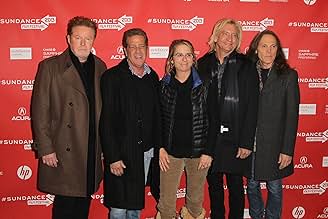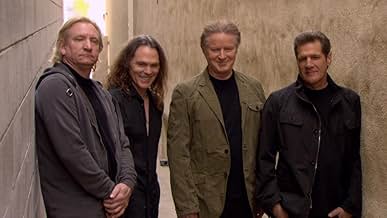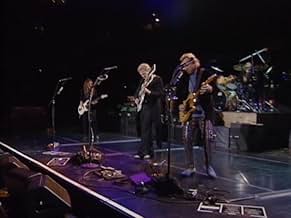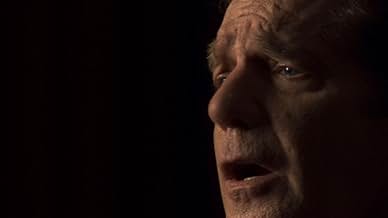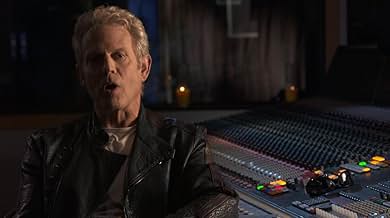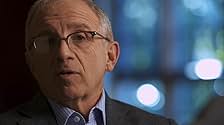CALIFICACIÓN DE IMDb
8.2/10
2.9 k
TU CALIFICACIÓN
La vida y la época del exitoso grupo de soft-rock estadounidense Eagles.La vida y la época del exitoso grupo de soft-rock estadounidense Eagles.La vida y la época del exitoso grupo de soft-rock estadounidense Eagles.
- Ganó 1 premio Primetime Emmy
- 3 premios ganados y 1 nominación en total
Explorar episodios
Opiniones destacadas
I saw the Eagles in concert back in the summer of 77 (Linda Ronstadt opened!) at KC's Arrowhead Stadium, when the Eagles were at their peak, shortly after "Hotel California" had been released. Fast forward about 4 years, early fall 1981, I was hung-over in the afternoon after having celebrated my bachelor party the previous evening. I would be getting married in about 5 hours and was scared shitless. So I popped a beer, lit up a joint, threw a steak on the grill and listened to the HC album as it was the perfect background music for my brain as I tried to get a perspective on where I had been and where I was going. (BTW, still married to my love) The Eagles and their music were the perfect soundtrack for my life during the 70's when my priorities were girls, booze, recreational drugs, girls, bars, music, cars and girls.
So I was and remain a huge fan, although not interested in paying $200 plus for decent tickets to see them in concert (I might have paid $10 in 1977) and I've viewed the SHO doc about 4 times, recently for the first time since Frey's passing. I assume virtually everyone reading this page has also viewed it, so all can do is offer a few thoughts on a solid documentary about a what was a truly great band.
As is with most of these type of documentary's, the most interesting part are the early years, when the Eagles formed a group after being sidemen for various bands in the LA music scene of the late 60's and early 70's. Henley made an excellent observation about making it big but realizing that there were other musicians and writers, just as talented, but for one reason or another didn't get the big career break. Sometimes it's just being in the right place at the right time and for the Eagles, the wave broke just perfectly. After hitting the band hit superstardom with HC, Henley and Frey would align to take creative control of the group, which would ultimately cause the departure of two of the other originals, guitarist Bernie Leadon and bassist Randy Meisner. Lead guitarist Don Felder joined the band on album #3 "On the Border" (my personal favorite) and kicked the band up a notch with his blistering work, plus wrote the music for tune "Hotel California" (Henley & Frey try to minimize his contribution.) And it seems after HC everything pretty much went into the shitter as far as their relationships with one another as greed, arrogance and drugs devoured the band.
Some nice reflections by Joe Walsh, who was already a big name in rock when he joined the group for HC, replacing Leadon. Walsh almost killed himself through years of drug and alcohol abuse. He was able to clean himself up when the group reunited in 94 after 13 years and was able to tolerate the arrogance of Henley and Frey. Felder wasn't willing and ultimately would be fired by Henley, Frey and their manager Irving Azoff, the consigliere of the band. In retrospect Felder may have made the mistake that many make, overvaluing their contribution and importance to their organization. He did file a lawsuit for breach of contract that was settled by both parties and wrote a book about his experience that ultimately left him persona non grata to Henley and Frey and not in consideration for any further work with the band.
To this day the Eagles are still touring, with only Henley left from the original lineup. More power to them,but maybe we would be best left with just our memories of perhaps the most outstanding band of the greatest era in rock.
So I was and remain a huge fan, although not interested in paying $200 plus for decent tickets to see them in concert (I might have paid $10 in 1977) and I've viewed the SHO doc about 4 times, recently for the first time since Frey's passing. I assume virtually everyone reading this page has also viewed it, so all can do is offer a few thoughts on a solid documentary about a what was a truly great band.
As is with most of these type of documentary's, the most interesting part are the early years, when the Eagles formed a group after being sidemen for various bands in the LA music scene of the late 60's and early 70's. Henley made an excellent observation about making it big but realizing that there were other musicians and writers, just as talented, but for one reason or another didn't get the big career break. Sometimes it's just being in the right place at the right time and for the Eagles, the wave broke just perfectly. After hitting the band hit superstardom with HC, Henley and Frey would align to take creative control of the group, which would ultimately cause the departure of two of the other originals, guitarist Bernie Leadon and bassist Randy Meisner. Lead guitarist Don Felder joined the band on album #3 "On the Border" (my personal favorite) and kicked the band up a notch with his blistering work, plus wrote the music for tune "Hotel California" (Henley & Frey try to minimize his contribution.) And it seems after HC everything pretty much went into the shitter as far as their relationships with one another as greed, arrogance and drugs devoured the band.
Some nice reflections by Joe Walsh, who was already a big name in rock when he joined the group for HC, replacing Leadon. Walsh almost killed himself through years of drug and alcohol abuse. He was able to clean himself up when the group reunited in 94 after 13 years and was able to tolerate the arrogance of Henley and Frey. Felder wasn't willing and ultimately would be fired by Henley, Frey and their manager Irving Azoff, the consigliere of the band. In retrospect Felder may have made the mistake that many make, overvaluing their contribution and importance to their organization. He did file a lawsuit for breach of contract that was settled by both parties and wrote a book about his experience that ultimately left him persona non grata to Henley and Frey and not in consideration for any further work with the band.
To this day the Eagles are still touring, with only Henley left from the original lineup. More power to them,but maybe we would be best left with just our memories of perhaps the most outstanding band of the greatest era in rock.
And this was an authorized bio. Wow.
Though I've loved The Eagles music, there was something I never liked about the band. So I decided to learn and find out more about the guys now that I have time. I always wanted to watch their documentary, and started to like them at the beginning of the movie. But boy did that change about halfway through. Now I think I had good intuition. Henley and Frey were total unlikable a-ho___s. My gosh.
Though I've loved The Eagles music, there was something I never liked about the band. So I decided to learn and find out more about the guys now that I have time. I always wanted to watch their documentary, and started to like them at the beginning of the movie. But boy did that change about halfway through. Now I think I had good intuition. Henley and Frey were total unlikable a-ho___s. My gosh.
After watching this again I still feel this was a monetary project from start to finish. It is nice to sit back and enjoy some of the music that you remember so well from the 70's decade. It is a pity that today's kids have nothing in the form of music or an identity that I had as a teenager in the seventies period. They have their phones and social internet and nothing else. There is not a single musician today that can even come close to entering the hero spaces musicians had in my teen years such as Dylan, Lennon, Roger Waters, down home southern poets like R.VanZant, and yes, Henley and Frey. For this reason I can relax some of my initial reaction to their egomania which is still painfully obvious. Don Henley's reaction to his very successful solo career which led to some masterful music in my opinion he just blows off with "I won some awards and had some hits" and finishes with his usual bombardment of everyone else and their unwillingness or inability to reach his own genius level-mainly producers, agents, songwriters and other musicians. He comes across as a total a$$ and seems to know it and not care the least-so be it.
The total highlights of the entire program belong to Joe Walsh for his honesty and in an indirect way to Linda Ronstadt and her blossoming sexually and "voice as big as a house" that I remember so, so well from that period. Again, there is nothing or no one today in terms of young female singers, that could match her talent or her effect on young men that I also remember so well- Henley's admission that she was "one of the boys" also reflects as an identical feeling I had about her at that time.
The star of the show is Joe Walsh as he seems so separated from the narcissistic love Henley and Frye have for themselves. His honest approach comes off as realist and sincere especially his reflections on how he remembers that era, as if it were a fiction novel, and using it for an example-brilliant! Perhaps some young people will take to heart what he has to say and use it to improve their own lives.
All the partying and some senseless nudity come across as flush material and the catfights between the former and current members of the group are nothing new to even casual fans of the band. I saw the Eagles live once during the Hotel California tour and their abilities as a live band, along with inspiring melodies and well rehearsed harmonies, were the impression I remember even today. Lynda Ronstadt was also touring with Jackson Browne about the same time and, of course, her show was unforgettable to say the least.
All in all this is a good production and I think people can use the ole saw "take what you want and leave the rest" and find this an enjoyable program to watch.
pa
How can you write a spoiler for a music program about 40year old songs?
The total highlights of the entire program belong to Joe Walsh for his honesty and in an indirect way to Linda Ronstadt and her blossoming sexually and "voice as big as a house" that I remember so, so well from that period. Again, there is nothing or no one today in terms of young female singers, that could match her talent or her effect on young men that I also remember so well- Henley's admission that she was "one of the boys" also reflects as an identical feeling I had about her at that time.
The star of the show is Joe Walsh as he seems so separated from the narcissistic love Henley and Frye have for themselves. His honest approach comes off as realist and sincere especially his reflections on how he remembers that era, as if it were a fiction novel, and using it for an example-brilliant! Perhaps some young people will take to heart what he has to say and use it to improve their own lives.
All the partying and some senseless nudity come across as flush material and the catfights between the former and current members of the group are nothing new to even casual fans of the band. I saw the Eagles live once during the Hotel California tour and their abilities as a live band, along with inspiring melodies and well rehearsed harmonies, were the impression I remember even today. Lynda Ronstadt was also touring with Jackson Browne about the same time and, of course, her show was unforgettable to say the least.
All in all this is a good production and I think people can use the ole saw "take what you want and leave the rest" and find this an enjoyable program to watch.
pa
How can you write a spoiler for a music program about 40year old songs?
10grantss
Great documentary on a great band.
Made in 2013, a documentary on the Eagles, from the early days of Glenn Frey and Don Henley to the (then) present day.
Includes interviews with the band members at different times in their lives, including in the mid-1970s. No narration, the movie is effectively narrated by the interviews.
Not your simple chronological telling of their story either, there is an examination of the impact of their music. Quite emotional at times.
Also quite bluntly told too. The frictions within the band are often examined and the truth is not sugar-coated.
A wonderful musical and emotional journey.
Made in 2013, a documentary on the Eagles, from the early days of Glenn Frey and Don Henley to the (then) present day.
Includes interviews with the band members at different times in their lives, including in the mid-1970s. No narration, the movie is effectively narrated by the interviews.
Not your simple chronological telling of their story either, there is an examination of the impact of their music. Quite emotional at times.
Also quite bluntly told too. The frictions within the band are often examined and the truth is not sugar-coated.
A wonderful musical and emotional journey.
One might think that should there ever be a Mount Rushmore of country rock, they may well etch the faces of the Eagles into the cliff side. However, they might need some time, for there have been quite a few comings and goings and line-up changes in camp Eagles over the years. This documentary ventures into the first chapter of the band's existence and provides evidence of the rifts, drifts, differences and fallouts that have occurred. It is probably fair to say that the Eagles are one of the most notoriously disharmonious of bands, who inexplicably and ironically orchestrate some of the most harmonious musical harmonies of any group since CSN. It is still a struggle today to meet a band that matches up vocally.
Although they may not straddle the earth with an omnipresence that marked their original inception and 1970s heyday, the reformed country rockers are still synonymous with classic radio and the rock album format.
Running at 2 hours, there is a lot of ground to cover. For a casual viewer, there is a mercifully breezy skip through respective childhoods and the pace is pushed with momentum towards the inspiring and prolific late-60s underground music scene of LA that homed residencies of Poco, Buffalo Springfield, Joni Mitchell, Jackson Browne, Linda Ronstadt et al. There is acknowledgment as to the creatively incestuous backdrop of the times, of the area and of the era. The sort that enabled artists to shift, move and collaborate seemingly at will. As the late 60s moved into the early 70s and success increased for the bulk of the aforementioned artists, it is clear that all look back with giddy rose-tinted glasses of nostalgia. The creativity was clearly as intoxicating as the drugs that they were recreationally self-medicating.
The Eagles were always a band that stood apart from their peers. They did so for a few reasons. One, is that they were massively successful in a way that the others could only dream of, another is that they had a steely core that made them efficiently consummate and business-like. Both of these aspects are highlighted by the documentary. The band reflect openly upon their motivations and inclinations, with a mix of new interviews and footage that dates back to the period. To see how much and how little they've changed is part of the joy of the feature. Around the mid-point, Joe Walsh arrives into the frame and is spotlighted in both the past and the present as an impassioned guitarist who is part-talent, part-court jester. His phrasing exudes a humorous hybrid of Keith Richards and Stephen Stills along with a healthy dose of his own breezy personality. For a music film, the tone is more or less consistently serious throughout, so his appearance offers some light hearted respite.
On the downside, there is not as much insight into the studio processes as a fan may want, but the band members are all given a fair hearing from both time periods and talk candidly about being in the epicentre of the Eagles whirlwind.
Understandably, Part One ends on a decisively sour note; their downfall and break-up. Although the pressures of topping the totemic Hotel California engulfed them all to a certain extent, it is clear that decisive fractures of the intragroup relationships had crippled the band. It is also evident that the distractions around the process was a demon that gobbled them up. Power may corrupt and absolute power may corrupt absolutely, but I am sure there is a pithy equivalent for success. Life in the fast lane had brought this group crashing into a ditch.
This is a tale that has enough acrimony to give Pink Floyd a run for their money. They may have been back together since 1994, as they will happily testify, but in case you're wondering, they only speak to Don Felder through lawyers. Some things don't change and won't be taken easy.
Although they may not straddle the earth with an omnipresence that marked their original inception and 1970s heyday, the reformed country rockers are still synonymous with classic radio and the rock album format.
Running at 2 hours, there is a lot of ground to cover. For a casual viewer, there is a mercifully breezy skip through respective childhoods and the pace is pushed with momentum towards the inspiring and prolific late-60s underground music scene of LA that homed residencies of Poco, Buffalo Springfield, Joni Mitchell, Jackson Browne, Linda Ronstadt et al. There is acknowledgment as to the creatively incestuous backdrop of the times, of the area and of the era. The sort that enabled artists to shift, move and collaborate seemingly at will. As the late 60s moved into the early 70s and success increased for the bulk of the aforementioned artists, it is clear that all look back with giddy rose-tinted glasses of nostalgia. The creativity was clearly as intoxicating as the drugs that they were recreationally self-medicating.
The Eagles were always a band that stood apart from their peers. They did so for a few reasons. One, is that they were massively successful in a way that the others could only dream of, another is that they had a steely core that made them efficiently consummate and business-like. Both of these aspects are highlighted by the documentary. The band reflect openly upon their motivations and inclinations, with a mix of new interviews and footage that dates back to the period. To see how much and how little they've changed is part of the joy of the feature. Around the mid-point, Joe Walsh arrives into the frame and is spotlighted in both the past and the present as an impassioned guitarist who is part-talent, part-court jester. His phrasing exudes a humorous hybrid of Keith Richards and Stephen Stills along with a healthy dose of his own breezy personality. For a music film, the tone is more or less consistently serious throughout, so his appearance offers some light hearted respite.
On the downside, there is not as much insight into the studio processes as a fan may want, but the band members are all given a fair hearing from both time periods and talk candidly about being in the epicentre of the Eagles whirlwind.
Understandably, Part One ends on a decisively sour note; their downfall and break-up. Although the pressures of topping the totemic Hotel California engulfed them all to a certain extent, it is clear that decisive fractures of the intragroup relationships had crippled the band. It is also evident that the distractions around the process was a demon that gobbled them up. Power may corrupt and absolute power may corrupt absolutely, but I am sure there is a pithy equivalent for success. Life in the fast lane had brought this group crashing into a ditch.
This is a tale that has enough acrimony to give Pink Floyd a run for their money. They may have been back together since 1994, as they will happily testify, but in case you're wondering, they only speak to Don Felder through lawyers. Some things don't change and won't be taken easy.
¿Sabías que…?
- TriviaThe documentary includes interviews from all seven members of the band through the decades
- ErroresGlenn Frey claims that "Take It To The Limit" was the Eagle's first number one record. In fact their first number one record was "Best of My Love" released over a year before.
- ConexionesFeatured in 2013 Primetime Creative Arts Emmy Awards (2013)
Selecciones populares
Inicia sesión para calificar y agrega a la lista de videos para obtener recomendaciones personalizadas
- How many seasons does History of the Eagles have?Con tecnología de Alexa
Detalles
- Fecha de lanzamiento
- País de origen
- Idioma
- También se conoce como
- La historia de los Eagles
- Productora
- Ver más créditos de la compañía en IMDbPro
- Tiempo de ejecución1 hora 34 minutos
- Color
Contribuir a esta página
Sugiere una edición o agrega el contenido que falta


